Are you looking for the best denture adhesive in the UK? There are various different products that can help keep your dentures securely in place, and it can be confusing working out which is best for you. Gels? Creams? Strips? Powders? Extra-strong? Zinc-free?
In this guide, we'll clarify the distinctions between these products, explaining their functionality and the outcomes you can expect. While finding the best dental adhesive for you may require trial and error, we trust this information is beneficial.
In This Article
- 1 How does denture adhesive work?
- 2 What are the different types of denture adhesive?
- 3 What to look for in denture adhesives
- 4 The best denture adhesives in the UK
- 5 What is the best denture adhesive for partials?
- 6 How can you keep dentures in place without glue?
- 7 What type of glue can you use to fix dentures?
- 8 Conclusion
- 9 FAQ's
How does denture adhesive work?


Whether you choose strips, powder, gel or cream, all denture adhesives work in more or less the same way. Denture adhesives work by firstly, forming a strong bond with your dentures. And, secondly, they attach to your gums to enhance the natural suction that holds your dentures in place.
Denture adhesive contains ingredients which react with your saliva to form an elastic layer, or membrane, which ‘sticks' to your mouth. This layer also helps fill any small gaps which may be causing your dentures to dislodge easily.
The benefits of using a denture adhesive are two-fold:
- Stop them from moving: Adhesives fix dentures to your gums securely, eliminating irritating movement and keeping them from falling off when you eat, speak, or laugh.
- Keep food out: Loose dentures let food get trapped between your dentures and your gums which can lead to irritation, pain, and bad odours.
Some brands also contain anti-bacterial ingredients to fight bad breath. The short video below illustrates how denture adhesives work:
Note that denture adhesive is not a solution for badly fitting dentures. Although it may help keep them in place, it's really better to see your dentist if you feel like your dentures don't fit properly.
What are the different types of denture adhesive?
We've established that there are several kinds of denture adhesive available. Each has its own pros and cons in terms of cost, effectiveness, ease of application, strength and longevity, but they can broadly be grouped into three categories:
- Adhesive Cream and Gel: Denture adhesive creams and gels are the most widely available and diverse option. To use denture cream, you apply a small amount to the undersurface of the dentures before placing them in your mouth and applying pressure to get a good seal. Denture adhesive cream offers a strong hold and comes in a range of flavours and textures so suit every taste. One downside is that there can be some unpleasant oozing if you use too much, or apply it in the wrong position on the dentures.
- Adhesive Powder: If you dislike the sensation of a cream, denture powder is another effective adhesive. Apply a light layer of the powder onto the undersurface of the dentures. Shake off any excess powder before inserting your denture and pressing or biting down. Like creams, adhesive powders can also provide an all-day hold. The powder form is also convenient to use, but can be a little messy. You also won't have so much choice between brands of denture adhesive powder in the UK.
- Adhesive Strips and Cushions: Denture adhesive strips and cushions are a relatively new concept, but they have some benefits over traditional methods. They come in pre-cut shapes (either thin strips or a denture-shaped cushion) containing a firm adhesive material. You just need to trim them down and wet them before application. They are easy to apply, more or less mess-free, and meant for all-day use, just like the other types of adhesive.
What to look for in denture adhesives
Choosing the best denture adhesive for you can be difficult. There are many strong products on the market – how do you pick just one to try? Use the following factors as a guideline when choosing which adhesive to purchase:


Ingredients
All denture adhesive ingredients are approved as safe for use in your mouth. However, some people may be allergic to certain ingredients, and there are risks if the adhesives are not used as instructed. The main ingredient that people worry about is zinc; poisoning can occur if the body is exposed to too much zinc, and there have also been reports of it leading to anaemia and neurological symptoms.
Fortunately, most denture adhesives in the UK are now zinc-free. In fact, only one of the mainstream brands featured below (Fixodent) still contains zinc. It is perfectly safe when used as instructed, but if you're reapplying it several times a day, you may be putting yourself at risk.
There are also some natural denture adhesives which avoid the petrochemical ingredients traditionally used for adhesion. You can read more details below.
Cost
Aside from a zinc-free formula, the cost of the denture adhesive is another important factor to consider. Price doesn't necessarily correlate to quality or effectiveness, so don't assume that you have to spend more to get a product that works well. On the other hand, if you have had little success with cheaper brands, it may be worth trying something different.
It can be difficult to compare denture adhesive prices side-by-side, since you need to consider the cost per usage rather than the overall cost of the product. When buying a cream or powder, the amount you use each time will depend on the size and shape of your dentures.
Form
The type of denture adhesives you select will impact how they are applied or used. If you are always on the go, you want to be able to choose adhesive that is easy to apply.
Reviews
When choosing a denture adhesive, it's always a good idea to read some reviews. Make sure these are from actual users who have tried the product for themselves for an accurate assessment. But do also keep in mind that personal preferences regarding flavour and texture can influence people's opinions.
The best denture adhesives in the UK
Now you know all about the different types and things to consider, let's look at some of the best denture adhesive products in more detail. We have included links to buy these products on Amazon, where you can often get a better price by buying in bulk. With a consumable product like this, saving a little on each tube or pack can quickly add up!
Denture adhesive creams and gels
We'll begin with the most common type of product: a cream or paste which you squeeze out of a tube onto your dentures. Remember that if you're looking for a zinc-free denture adhesive, it's only Fixodent you need to avoid. All of the other products mentioned here are made without zinc.
Secure Denture Adhesive
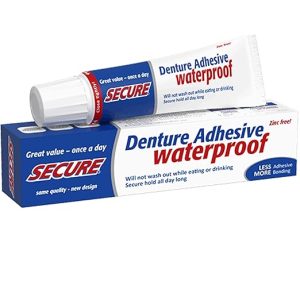

Secure Denture Adhesive uses a unique non-water-soluble formula, meaning that it should be unaffected by anything you eat and drink, and won't break down during the day.
It's imported from the US, but although you pay a slight premium compared to well-known UK brands, many users think it's worth it. You also only have to use 2-3 pea-sized amounts for each application, so a single tube should last much longer than a product that requires greater coverage.
Secure adhesive for dentures is flavour-free so shouldn't leave a funny taste in your mouth. They also make this version with aloe vera and myrrh for sensitive gums.
Overall, reviews are very positive and many people say they won't go back to Poligrip or Fixodent after trying Secure.
Poligrip
One of the biggest names in denture adhesives in the UK, Poligrip, also has the largest range of products. Here's a summary of the adhesive creams they make:


- Poligrip Flavour Free: A standard adhesive with no added flavours
- Poligrip Ultra: Strong denture adhesive with a fresh mint flavour
- Poligrip Max Seal: Superior coverage dental fixative that seals out up to 74% of food particles
- Poligrip Cushion & Comfort: Provides a protective gel layer in addition to adhesion
So, whether you're looking for a stronger denture adhesive or have a problem with food getting stuck under your dentures, there's a product here for you. Poligrip products have been scientifically proven to provide users with extra bite force and hold. They also have specially designed tips to make application as simple and mess-free as possible.
Fixodent
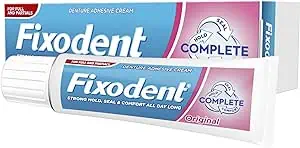

Fixodent is one of the denture adhesives in the UK that does still contain zinc. But, as we noted above, that shouldn't put you off using it – just be sure to follow the instructions.
Original Fixodent denture adhesive cream has a light mint flavour and provides a 10x stronger hold than using no adhesive. You can also buy Fixodent Plus which has no flavour and offers an even stronger hold.
Fixodent and Polygrip are both good products to try if you're getting used to new dentures or using an adhesive for the first time. They have numerous loyal customers who have been happily using them for years, and many find that they get an all-day hold from just one application.
Cushion Grip Thermoplastic Denture Adhesive
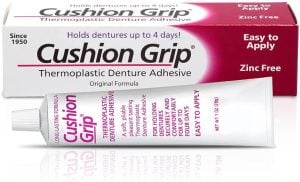

Cushion Grip is a thermoplastic denture adhesive, and it's designed to add a soft layer to your dentures for greater comfort, at the same time providing a more secure fit. The tube needs to be placed in hot water before use, to soften the adhesive enough to apply to your dentures. It should stay in place for up to 4 days, after which you should place your dentures in warm water for 10-20 minutes before peeling off the plastic.
Cushion Grip was first produced in 1950 and gained many fans, but it was discontinued for a while. Many users were pleased to see it return more recently, using the same traditional formula.
“Have used this product for ages. Was devastated when it disapeared for so long. So pleased to be able to buy it again.”
-Amazon reviewer
“I love this product my lower denture has never been so comfortable. At last I have found something that works.”
-Patricia
“After following instructions to the letter I found that this product just didn't do as I was hoping it would, that was to make denture more comfortable.”
-angelasalmon
Note that if your denture is uncomfortable because it doesn't fit properly, a denture reline kit may help until you can get to a dentist to sort it out.
Natural denture adhesive
NaturDent vegan dental adhesive
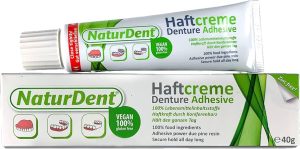

A lesser-known name, but offering an alternative natural fixative, is NaturDent. This product uses the natural properties of pine resin for denture adhesion. It's made with 100% food grade ingredients and is vegan, gluten-free, and zinc-free.
Some users are alarmed to see Polyvinyl acetate (PVA) listed as one of the ingredients – yes, the same stuff that's used in that white glue. It might not sound like something you want to put in your mouth, but it is approved for food use, and is often used in chewing gum. Not everyone would consider it a natural product, but it is there to create a watertight bond.
Denture adhesive powder
Fixodent Extra Hold Fixative Powder
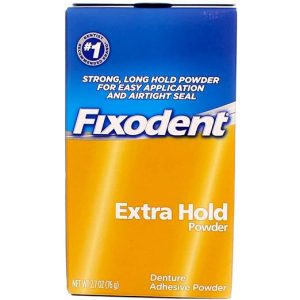

Fixodent has been around for several decades and is recommended by dentists. The packaging might look a bit outdated, but many denture wearers swear by this product and say they will never go back to their old adhesive or other creams after trying it.
Some of the main benefits that users comment on are:
- No “slimy residue” that you get with pastes
- Holds dentures firmly
- Easy to clean
- Completely flavourless
Unlike creams, which usually have to be applied to dry dentures, you should apply a thin layer of powder while your dentures are still wet from cleaning. The moisture activates the powder, forming a comfortably cushion and keeping the dentures in place.
The ‘Extra Hold' product is the strongest denture adhesive powder from Fixodent. Their alternative powders in the range such as the original, plus scope and food seal powders, dont have such a strong hold and many people have been caught out purchasing the wrong one. If you're looking for a strong, all-day hold, be sure to buy Fixodent Extra Hold.
Denture adhesive strips and cushions
If you find pastes and powders messy, one of these products might be a good alternative.
Seabond Denture Fixative Seals
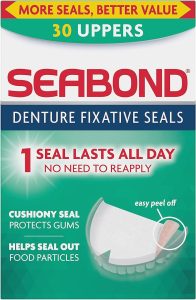

Seabond denture adhesive seals come in two types, for upper and lower dentures. If you wear partials, choose the product that is the best fit for the shape of your denture plate. The seals consist of a thin piece of fabric pre-coated with double-sided adhesive.
The first thing you'll need to do is trip the adhesive cushion down to the right size for your denture. Once you have the shape right, you may want to use that as a template to trim all the others in the pack so they are ready to use. If you find that it bunches up, you can cut a small ‘V' shape to create more room.
You need to moisten the seal before applying it to your dentures and then fitting them in your mouth.
Seabond denture adhesive reviews seem quite polarised. Some users love them because they don't have the messy oozing of creams. Others find them fiddly to use and not as long-lasting as other products. They're approved by the Oral Health Foundation, so if you're looking to try something new, you might find success with Seabond.
Super Poligrip Comfort Seal Strips
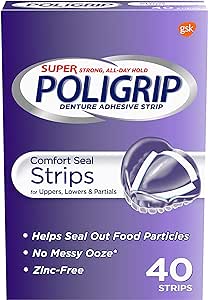

These denture adhesive strips from Poligrip work in a similar way to Seadent, but they come in thin strips. They can be used for full upper and lower dentures as well as partials. You may need to cut them down to avoid overlapping the strips, but any excess can be kept for another time.
They are zinc-free, like Poligrip's other denture adhesives, and help to seal out food particles – although a full seal will depend on your placement of the strips.
The box advertises “no messy ooze”, but a lot of customers disagree with this. “This product does the job very well, the only down-side being the gooey mess left in the mouth after removal of the denture,” says one reviewer, with another commenting “Does the job, but a bit ‘gooey' in the mouth after a while.”
Some people consider this the best partial denture adhesive:
“These strips are perfect and I now can't do without them. They don't last ALL day (with me) but a very good half day. I would certainly recommend them to anyone who has partials.”
-Mazzy
Best denture adhesives in the UK: Summary
Really, the takeaway from these denture adhesive reviews is that everyone's mouth and dentures are different, and the best product for one person may not work for someone else. If you have tried one or two products and been dissatisfied, keep persevering. Many denture wearers only get the perfect fit and hold after several failed attempts. Now you are aware of the different options like powders and strips, you can give them a try as well.
Here's a quick summary of the products we mentioned above, plus where to buy them.
Brand | Type | Pros | Cons | Price |
Secure | Cream/Paste | Non-water-soluble, long-lasting | Imported from the US | |
Poligrip | Cream/Paste | Several products for different needs, special application tips | Doesn't work for some people | |
Fixodent | Cream/Paste | Several varieties, strong hold | Contains zinc (which some people avoid) | |
Cushion Grip | Cream/Paste | Adds comfort, lasts up to 4 days | Doesn't work for some people | |
NaturDent | Cream/Paste | Natural ingredients, pine resin adhesion | Does contain PVA | |
Fixodent Extra Hold Powder | Powder | Strongest pwder from a larger range | Contains zinc (which some people avoid) | |
Seabond | Seals/Cushions | No mess and ooze | Need to be cut to size | |
Super Poligrip | Strips | Fit any size of denture, easy to apply | Need to be cut to size |
What is the best denture adhesive for partials?
If you have a partial denture, any of the aforementioned products should work to secure it in place and keep food particles out. You can buy Poligrip strips and cut them to the right size to fit. Or, just apply a cream or powder in the same way as for a full denture.
The same care instructions apply: clean and dry your partial denture before applying denture adhesive, and be sure to rinse it after use to remove any residual glue.
If you wear a traditional partial denture and are having problems with the fit, you may want to consider a flexible denture next time you get a replacement. These – as the name suggests – are made from a flexible material that fits around the exact contours of the mouth and should stay in place without adhesive. These dentures are also known as Valpast partial dentures because they are the most well-known type of flexible denture available.
How can you keep dentures in place without glue?
If you'd prefer not to use any of these products, or have found they simply don't work very well, it is possible to make your own DIY adhesive at home, but this rarely works well. If you find yourself needing to keep your dentures in place and don't have any adhesive to hand, a smear of smooth peanut butter can actually work quite well – at least for a couple of hours while you grab some proper adhesive.
There are also a few lifestyle choices that will help limit the movement of dentures, reducing the need for an adhesive:


- Avoid eating sticky foods: A good example of this is chewing gum. When you are wearing dentures, you need to avoid sticky foods because it can pull them out of place. Replace chewing gum with mouthwash or sugar-free mints, and suck on sticky sweets rather than chewing them.
- Keep dentures moist: The base of your denture is made with flexible polymer materials which need to be kept moist in order to ensure a good seal. If the material gets too dry it will become brittle. So, when you take your dentures off, it is important that you soak them in water or a denture cleaning solution that will keep them moist.
- Handle with care: You need to be very cautious when handling your dentures so as not to break or deform them. When putting your dentures on, always do it in front of a mirror so you can correctly position things. If you use too much force or drop them, this can cause damage that will affect the fit.
- Get them adjusted: If you notice that your dentures are constantly slipping out of place, it might be time to visit your dentist. They can re-adjust the fit of your dentures so they can fit comfortably and be secured in place. They can also advise you on finding the best denture glue for your needs.
What type of glue can you use to fix dentures?
You can get a denture repair kit like this one from Dentemp, which lets you temporarily fix cracks and loose teeth with a special kind of glue that's safe to use in your mouth. However, the glue you can use to fix your dentures is not the same adhesive you use to keep them in place.
Don't try to use superglue or any other multipurpose household glue to fix your dentures, as these can contain harmful chemicals.If your dentures or damaged or broken, you should take them to your dentist or a dental lab, even if you are able to successfully repair them at home.
Conclusion
Dentures are meant to fit perfectly in your mouth, without slipping, sliding or falling out. When you first get your dentures, they should provide a perfect fit. But many people find that after a while, dentures stop fitting so well. This can be due to daily wear and tear of the denture, or a change in the actual structure of your mouth.
If your dentures cause discomfort or frequently dislodge during activities like eating or speaking, consulting your dentist for a reline or replacement is advisable, or even an upgrade to implants. But if that's not possible yet, then choose the best denture adhesive that's comfortable for you and keeps your dentures secure.
FAQ's
How does denture adhesive work?
Whether you choose strips, powder, gel or cream, all denture adhesives work in more or less the same way. Denture adhesives work by firstly, forming a strong bond with your dentures.
What are the different types of denture adhesive?
We've established that there are several kinds of denture adhesive available. Each has its own pros and cons in terms of cost, effectiveness, ease of application, strength and longevity.
What is the best denture adhesive for partials?
If you have a partial denture, any of the aforementioned products should work to secure it in place and keep food particles out. You can buy Poligrip strips and cut them to the right size to fit.
How can you keep dentures in place without glue?
If you'd prefer not to use any of these products, or have found they simply don't work very well, it is possible to make your own DIY adhesive at home, but this rarely works well.
What type of glue can you use to fix dentures?
You can get a denture repair kit like this one from Dentemp, which lets you temporarily fix cracks and loose teeth with a special kind of glue that's safe to use in your mouth.
Which is stronger Fixodent Vs Poligrip?
The strength of Fixodent or Poligrip depends on individual preferences and needs. Fixodent offers a strong hold with a focus on comfort, while Poligrip emphasizes a secure hold with a cushion for gum comfort. Ultimately, the choice between the two depends on personal comfort and effectiveness preferences.
NCBI: Denture Adhesives in Prosthodontics: An Overview. Consulted 16th February 2020.
Journal of Prosthodontists: A clinical study to evaluate denture adhesive use in well-fitting dentures. Consulted 11th January 2020.




